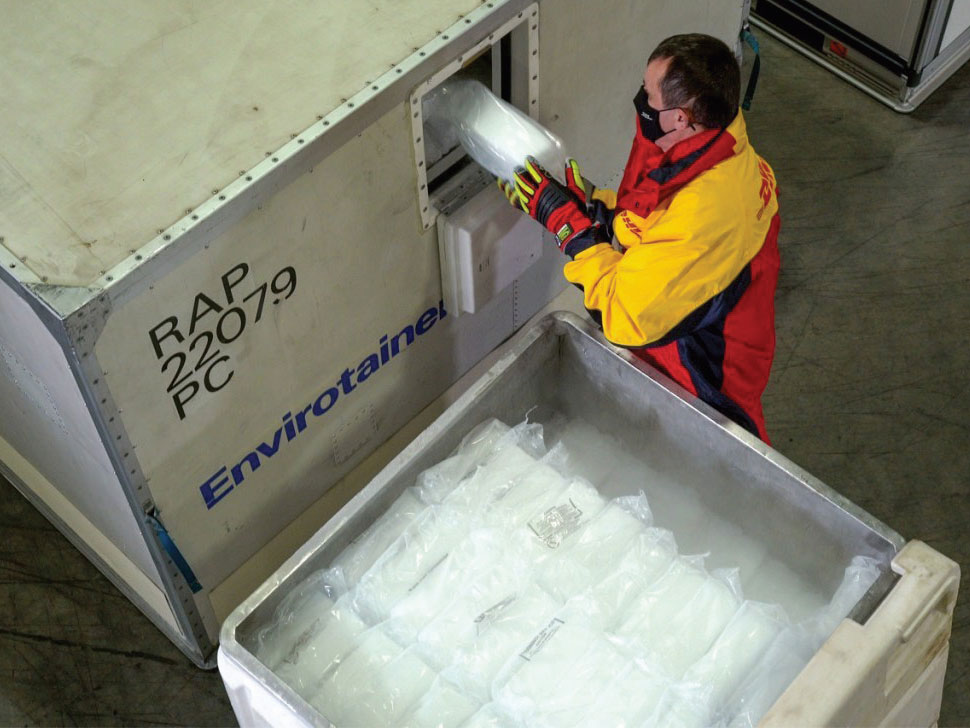
The healthcare supply chain is battling a public immunization effort that has attained previously-unimaginable complexities. The transportation of temperature-sensitive and precious vaccines is central to controlling the Coronavirus pandemic.
The cold chain logistics industry is therefore central to this epic challenge.
Beyond the billions of COVID-19 vaccines needed around the world, extremely cold temperatures must carry throughout the distribution process.
According to the Healthcare Distribution Alliance (HDA), most cold chain products require storage and transportation at two- to eight-degrees Celsius (36-46F), while frozen products need to be kept below minus 10 degrees Celsius (14 F).
But HDA notes, some of the leading COVID-19 vaccine candidates are classified as “ultra-cold chain” and need to be held at temperatures below minus 80 degrees Celsius (-112 F).
HDA notes that healthcare system distributors “are the logistics experts of healthcare, ensuring the safe, efficient and reliable delivery of approximately 93 percent of the medicines purchased in the United States. As the backbone of the pharmaceutical supply chain, distributors connect 180,000 providers and pharmacies with 1,400 drug manufacturers nationwide, and through core and value-added services, distributors save the U.S. healthcare system between $33 and $53 billion annually. As the country faces extraordinary demand for medicines and healthcare supplies during COVID-19, distributors are leveraging their strong relationships to support both ends of the supply chain.”
“The private sector must work hand-in-hand with the government on solutions,” Mike Kaufmann, Cardinal Health CEO, a U.S. leader in distributing health care supplies, noted in a November report: “Supply chain disruption” for the healthcare industry is “everywhere and it’s impacting all of us,” Kaufmann said. “Every corner of the supply chain is experiencing unprecedented challenges – from sourcing and capacity constraints at places of origin, to bottlenecks at destination ports, congestion on the rails and the roads – all of which are causing significant delays in critical goods.” Adding, at Cardinal Health, “we are redesigning our processes to meet the moment, but changes to industry processes will have a greater, more immediate impact. We could greatly reduce bottlenecks at some ports by changing the rules on how to return empty containers. These restrictions significantly constrain the efficient use of trucking power and chassis and are a major contributor to both gridlock and reduced trucker capacity. We are working with other industry leaders to create a process that better aligns the operations of ports, rail, trucking and distribution centers.”
He added: “In the face of unprecedented demand, we can’t just wait to build something new. We also need to create partnerships that combine capabilities to solve complicated problems.
“Every industry is facing shipment delays, but we must prioritize releasing backlogged containers with critical medical supplies to ensure our nation’s health and safety. …We need to develop a ‘fast pass’ system that expedites the release of containers carrying medical supplies to port truckers so these products can be picked up first.”
“Real-time visibility is key to responding with agility at every point in the supply chain where challenges can occur,” Kaufmann said. “We need to leverage technology to create end-to-end visibility solutions across all foreign and domestic transport modes, including trucking and air transportation, so we know where critical medical supplies are at any point in the supply chain. At our company, we’re piloting visibility solutions across our broad network so we can adapt to meet customer need.”
Kaufmann continued: “We are encouraging Congress and the Administration to bring meaningful relief to healthcare providers including releasing additional Provider Relief Funds and supporting efforts to overcome staffing shortages. We’re using our voice to advocate for healthcare providers; without critical medical supplies, the pressures on our healthcare system – which have already been immense as the pandemic stretches into its second year – will continue to build for the foreseeable future.
The International Finance Corp. (IFC) reports: “The lack of cold storage and refrigerated transport in the medical sector alone contributes to 1.5 million vaccine-preventable deaths among children, every year.
“The current COVID-19 pandemic will most likely place further demands on TCL (temperature-controlled logistics) infrastructure around the world. In order to maintain the stability of COVID-19 vaccines, they will need to be transported and stored at low temperatures from the factory to the point of use.
Successful distribution of leading vaccines “will not translate into results on the ground without additional investments in temperature-controlled logistics infrastructure around the world,” according to IFC. The group, which is owned by the World Bank, offers long-term financing and industry-leading expertise to develop infrastructure projects that provide essential services—including electricity, telecommunications, transportation, water and sanitation—in partnership with the private sector.
IFC is working to create new private investment opportunities in temperature-controlled logistics.
In emerging markets, there are likely to be significant gaps, given the much larger order of magnitude of the proposed vaccination effort over a shorter period of time compared to existing vaccines. Establishing and maintaining the cold chain for the COVID-19 vaccine is expected to be a challenge even for rich countries. In developing countries, some of which are unable to properly handle the cold chain needs for existing vaccinations, the task will be even more difficult. Developing countries often lack the cooling infrastructure and equipment, such as refrigerated storage and trucks, required to maintain large quantities of a vaccine at a constant low temperature through final delivery. Deficiencies in electricity supply can make refrigeration unreliable. Creating the capacity to deliver the COVID-19 vaccine will require investments in both TCL infrastructure and electricity generation. Most governments do not have the capacity to plan investment projects in TCL, while private-sector entities have developed technologies and business models that could potentially be deployed in emerging markets.




